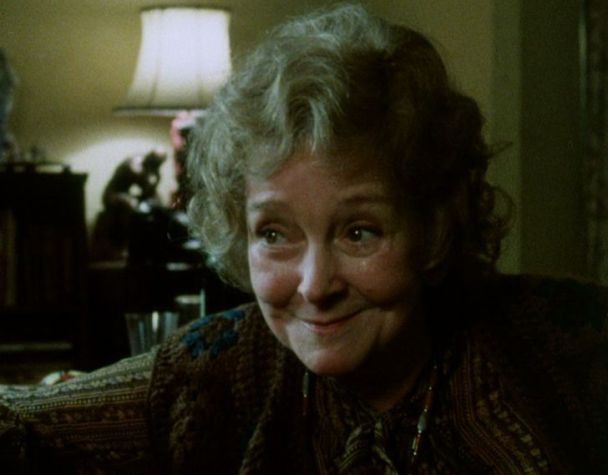
Cyril (Leo McKern) and Amos (Alec Guinness) are two British D-Day veterans who have returned to Normandy fifty years on in order to pay tribute to their fallen comrades. Whilst in the area, Cyril is determined to track down the alluring Angelique (Jeanne Moreau) who helped to keep the morale of the troops up during their stay back in 1944. The only problem is that he’s got competition – an abrasive American veteran, Waldo (John Randolph), has arrived on the same mission.
Roy Clarke might be best known for writing several comedy juggernauts (such as Last of the Summer Wine and Open/Still Open All Hours) but there are many less well known nuggets buried within his cv such as this Screen One, originally broadcast in September 1993. The ninety minute screenplay wastes no time in setting up the basics of the story – before we’ve reached the fifth minute we already understand that Amos is a shell of a man (possessing the mind of a child and a very limited vocabulary) with Cyril cast in the role of his exasperated carer. Meanwhile, Waldo is depicted as a short-tempered Limey-hating Yank ….
Amos is a gift of a role and Guinness milks it for all that it’s worth. With more than a touch of Stan Laurel, Amos breezes through the story with an air of benign innocence. As we proceed there are hints of hidden depths though – his skill with the mouth organ, say – whilst various mysteries (such as why he brought an empty jam jar all the way from Britain) are answered.
If Guinness’ screen presence is one reason why A Foreign Field is so compelling, then Leo McKern’s wonderfully judged performance as Cyril is another. Best known, of course, for Rumpole of the Bailey, there’s something of a Horace Rumpole feel about Cyril. They both might be abrasive on the surface but they contain hidden depths when you dig a little deeper. McKern was always a favourite actor of mine and this role – one of his final screen credits – only served to cement my respect for him. Cyril’s late monologue (where he explains to the others exactly why he’s so protective of Amos) is simply spine-tingling.

John Randolph has a slightly less well defined role. Waldo and Cyril might both be grumpy, but there’s no doubt that we’re meant to side with Cyril and find Waldo to be somewhat insufferable. The introduction of Angelique strikes the only off-key note in the story – it’s barely credible that Cyril and Waldo would be so shocked to discover that fifty years on she’s not exactly the same beautiful young girl she once was (and their desperate attempts to get out of the date they’d both arranged with her leaves a slightly bitter taste). Luckily this only lasts a fleeting moment and soon Angelique joins their ever-growing party.
Along with Guinness, McKern and Jeanne Moreau, Lauren Bacall is another incredibly strong addition to the cast. Forever linked to Humphrey Bogart – both on screen and by marriage – there’s no doubt that her casting was something of a coup. Her character, Lisa, has one of the most intriguing roles to play. Like the others she’s come to pay her respects to a fallen war hero (in her case, her husband) but there’s a late twist which you may or may not have seen coming. This is resolved in a beautifully understated way which fits perfectly with the rest of the story.
If Cyril and Amos exist without family ties (except the bond between them) then Waldo is luckier on this score (or unlucky, depending on how you view things). He’s arrived in France with his strident daughter, Beverley (Geraldine Chaplin), and her put-upon husband Ralph (Edward Herrmann). They enjoy a decent share of the narrative and both end the story in different places from where they started – Beverley is more relaxed (thanks to the influence of Lisa and Angelique) whilst Ralph emerges as a more assertive type. As with the others, Roy Clarke is skilful at drawing out various nuances and character moments.
Whilst A Foreign Field is a sentimental piece, it never feels mawkish or false. Roy Clarke’s screenplay, and the efforts of the cast, combine to produce something quite special. I’ve come back to it on numerous occasions down the years and I’m sure that I’ll continue to do so in the future. If you’ve never seen it, then I would very strongly recommend picking up a copy.
Originally released in the UK on DVD by Acorn, it’s now been brought back into print by Simply. Picture quality (4:3 full frame) looks fine with no significant issues (subtitles are included).
A Foreign Field is released by Simply Media today, RRP £14.99, and can be ordered directly from Simply here (quoting ARCHIVE10 will apply a 10% discount).












